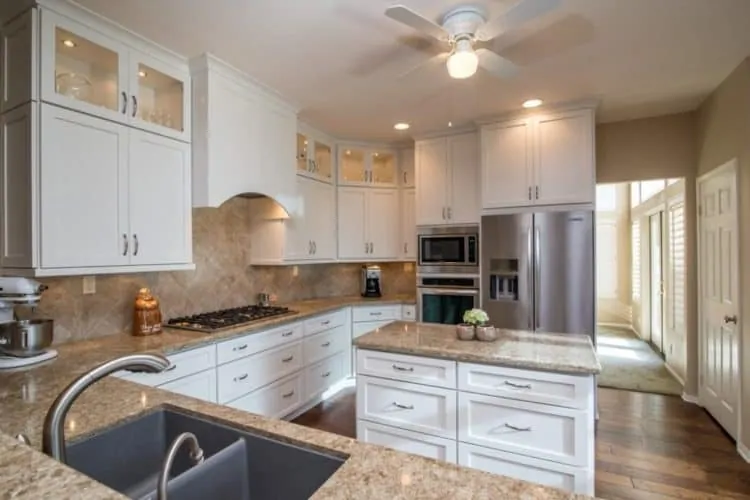
- By Remodel Works
- In Countertops
Quartz Countertop Care & Maintenance
Quartz has proven itself to be one of the most popular materials for countertops, and it’s no wonder why! It’s naturally one of the hardest and most durable surfaces on earth, but that doesn’t mean your quartz countertops won’t require their fair share of maintenance and care. Here are our best tips on how to maintain quartz countertops.
What is Quartz?
Quartz countertops are derived from the mineral quartz, which is a chemical compound consisting of one part silicon and two parts oxygen (making it silicon dioxide or SiO2). It is one of the most abundant minerals on Earth (along with feldspar), and its unique properties make it one of the most useful natural substances.
Quartz is present and plentiful in all parts of the world. It forms at all temperatures and is abundant in igneous, metamorphic, and sedimentary rocks. It is highly resistant to both mechanical and chemical weathering. This durability makes it the dominant mineral of mountaintops and the primary constituent of beach, river, and desert sand. Quartz is ubiquitous, plentiful and durable.
Quartz occurs naturally in virtually every color. Common colors are clear, white, gray, purple, yellow, brown, black, pink, green, red. Its luster and color make it useful as a gemstone and also in the making of glass.
Quartz in the Home
Engineered quartz has become one of the frontrunners in homes for kitchen and bathroom countertops. The type of quartz that is used for these countertops varies: some quartz countertop material is made of naturally quarried slabs of quartz, while a lot of newly engineered quartz countertop material is engineered with approximately 95% ground quartz and 5% resins.
One of the main reasons that quartz has become so popular as a household material is its natural hardness and durability. Many people end up choosing engineered quartz for the variety of aesthetic options – it’s available in such a wide variety of colors and textures.
Quartz is one of the most popular countertop materials and often chosen over other materials, like granite, because it is equally as strong but has the added benefit of being more flexible. This makes quartz easy to work with, and can allow for a simpler installation process. And because quartz is more flexible to work with and is held in place using glue and epoxy instead of screws, quartz can be used for backsplashes and even shower enclosures, without the fissures and seams that are visible with natural stone. Still, quartz countertops should always be professionally installed, mostly because of their weight and size.
In addition to being popular, quartz is also one of the heaviest countertop materials. Compared again to granite – their exact density varies from sample to sample, but overall quartz averages about 2.65 g/cc and granite comes in a little heavier at 2.7 to 2.8 g/cc. Countertops of comparable size of granite and quartz will weigh about the same, give or take a few pounds. Because engineered quartz is significantly heavier than other stone surfaces, there are some special installation considerations – structural issues should be assessed before installing quartz countertop, especially on upper floors.
Many homeowners and home designers love quartz because of its unique and custom appearance. These stones are coming right out of the earth and are not perfectly designed by nature. For some, this will be a benefit while others will consider it to be a drawback.
The natural derivation of quartz also says something about its environmental impact. As far as countertop options go, quartz materials generally leave less of a carbon footprint. Many of these products contain content that has been recycled, and the manufacturing process is more environmentally friendly.
Before choosing to go with quartz countertops, be sure to research price options. This can be the biggest consideration when it comes to choosing between a quartz countertop and one that’s made of another material, like granite or laminate. The cost of engineered quartz countertops appears to be dropping as they grow in popularity and as more manufacturers make them available, but in general, they are more expensive than laminate and comparable in price to granite, ranging from $100 to $200 per square foot (HGTV).
To learn more about Quartz compared to other countertop materials, check out our Countertop Material Comparison Guide.
How to Maintain Quartz Countertops
A natural benefit of quartz countertops is the minimal cleaning required to keep them sanitary and functioning at their highest potential. Due to the non-porous nature of the material, stains and spills are not easily absorbed into the surface and quartz is incredibly resistant to staining and corrosion from oils, liquids and most household cleaning products, which makes clean up and fairly easy job.
Although quartz countertops will resist permanent staining when exposed to liquids like wine, vinegar, tea, lemon juice, and soda, or fruits and vegetables, it’s important to wipe up spills immediately—before they have a chance to dry. Fresh spills can be wiped up with a simple household cleaner or dishwasher detergent and a soft cloth (although some people find that window cleaner works best).
Simply apply the cleaning product or detergent to any stains, leave the cleaner on the surface for about two minutes, and remove with a non-scratch pad. After wiping off the household cleaner, use a damp cloth to remove any residue, then dry the surface.
For tougher stains like food, nail polish, or paint, it is recommended to keep a plastic putty knife handy to gently scrape off messes that harden as they dry. But be sure not to use a sharp knife near your quartz countertops – quartz is a hard surface, but not hard enough to withstand the effects of sharp objects like knives.
Here is a step-by-step guide for how to clean quartz countertops:
- Wipe down your quartz countertops with a soft rag and mild detergent. Clean the counter with soap and warm water daily, if possible.
- For any dried food or other stains, use a blunt scraper such as a plastic putty knife to scrape off and then remove.
- For grease stains, wipe away grease with a degreasing cleaner. Spray the counter with a degreasing and disinfectant cleanser that doesn’t contain bleach. Alternately, use disinfectant bleach-free wipes. Rinse immediately afterward with a sponge or wet cloth. For grease stains, look for cleaning products that are specifically formulated for quartz countertops.
- For extra tough stains or anything sticky, you can also use a cleaning solution like Goo Gone. Wet a cloth with a citrus cleaner like Goo Gone. Try pouring a bit of cleaner onto the stain and allow it to sit for five to ten minutes before wiping it up, if the stain is particularly tough. Follow up by cleaning the counter well with warm water.
- Be sure to dry countertops off with a towel after you finish cleaning.
Although quartz is resistant to most stains, it is not resistant to harsh chemicals.
Do not expose your quartz surfaces to abrasive, strong alkaline, acid, free radicals, oxidizers or the like (whether high, neutral or low pH) cleaners. Furthermore, other popular cleaning products like bleach, oven cleaners, Comet®, and paint thinners will do more harm than good for your quartz countertops. Never use abrasive or harsh scrub pads; instead use soft pads and cloths.
And finally, do not apply any sealants or topical treatments to quartz surfaces, since these types of products will wear off and cause the gloss to appear dull and loose its natural sheen.
Keep Heat Away from Quartz
It’s important to note that quartz countertops are not heat-proof. Unlike some other natural stones, quartz can be damaged by heat, so homeowners should be prepared to protect their quartz countertops with the use of trivets and hot pads to prevent heating the top.
Refrain from placing hot skillets or roasting pans directly onto the surface of quartz countertops, and be aware of the potential damage to the surface by heat-generating appliances such as electric grills or crockpots. In addition, as with any natural stone, prolonged exposure to heat may cause cracks in quartz countertops.
Another potential drawback, or quality to be aware of with quartz countertops is that they can discolor over time when exposed to direct sunlight. If you have a part of your counter that receives some of the UV rays from the sun while another part doesn’t, over time you may see a color difference. Otherwise, quartz countertops will weather and age fairly well.
Quartz countertops are incredibly durable. With just a small amount of care, your quartz surfaces will look as great as the day you installed them for years to come.









